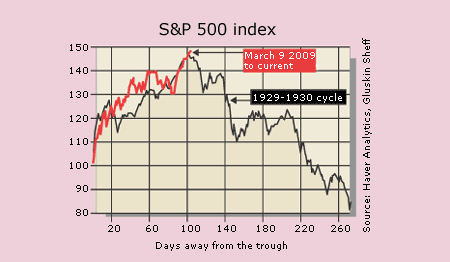Get the latest financial news, insights and expert analysis from our award-winning MoneyWeek team, to help you understand what really matters when it comes to your finances.
You are now subscribed
Your newsletter sign-up was successful
Want to add more newsletters?

Twice daily
MoneyWeek
Get the latest financial news, insights and expert analysis from our award-winning MoneyWeek team, to help you understand what really matters when it comes to your finances.

Four times a week
Look After My Bills
Sign up to our free money-saving newsletter, filled with the latest news and expert advice to help you find the best tips and deals for managing your bills. Start saving today!
The US market is "way ahead of itself", says David Rosenberg of Gluskin Sheff. The S&P 500 has now rallied by almost 50% in five months. There hasn't been such a rapid rise in such a short time and "without anything more than tentative signs of economic improve-ment" since the bear rally of 1930.
Since 1950, every time stocks reached the 50% mark, corporate profits had, on average, grown by 12% and GDP by 4.5%. Employment had revived strongly and bank lending was expanding at a 5% clip. But not in this rally; all these key economic numbers are still "trying to make a cycle low", says Rosenberg.
It also bodes ill that valuations both now and then never reached levels typical of long-term, bear-market bottoms, as the FT's John Authers wrote. Just as they did in 1930, stocks look pricey again after their latest run-up. But the most worrying sign is that this rally has tracked the 1930 rally very closely. The latter saw a 48% jump in five months almost exactly where we are now before sliding to new lows.
MoneyWeek
Subscribe to MoneyWeek today and get your first six magazine issues absolutely FREE

Sign up to Money Morning
Don't miss the latest investment and personal finances news, market analysis, plus money-saving tips with our free twice-daily newsletter
Don't miss the latest investment and personal finances news, market analysis, plus money-saving tips with our free twice-daily newsletter

The cost of the financial crisis could reach $11.9trn, says Edmund Conway in The SundayTelegraph around 20% of world GDP and equivalent to £1,779 per person. This is the total sum governments have made available; it includes direct capital injections as well as liquidity facilities offered by central banks and state guarantees of bank debt guarantees, not all of which will be called upon.
"Remittances provide a lifeline to many poor countries,"says the World Bank's Dilip Ratha. Money sent home by migrant workers adds up to 34% of Moldova's GDP, for example. Last year, global remittances grew by 15% to $328bn, but now they are following developed-world growth downwards.
Mexico's remittances, dominated by money earned in the construction sector, mirror the trend in US housing starts with a lag of four months, says The Economist. Immigration restrictions, triggered by rising jobless figures, are not helping. Overall, remittances could fall by up to 10% in 2009, says the World Bank.
Get the latest financial news, insights and expert analysis from our award-winning MoneyWeek team, to help you understand what really matters when it comes to your finances.
MoneyWeek is written by a team of experienced and award-winning journalists, plus expert columnists. As well as daily digital news and features, MoneyWeek also publishes a weekly magazine, covering investing and personal finance. From share tips, pensions, gold to practical investment tips - we provide a round-up to help you make money and keep it.
-
 Should you buy an active ETF?
Should you buy an active ETF?ETFs are often mischaracterised as passive products, but they can be a convenient way to add active management to your portfolio
-
 Power up your pension before 5 April – easy ways to save before the tax year end
Power up your pension before 5 April – easy ways to save before the tax year endWith the end of the tax year looming, pension savers currently have a window to review and maximise what’s going into their retirement funds – we look at how

